Spike’s Slam-Dunk
I haven’t seen the tracking on Inside Man (Universal, 3.24), but I’ll tell you one thing for damn sure. It’s going to be the top box-office dog when it opens five days from now. In fact, it’s quite obviously…hello?…the most commercial film ever directed by Spike Lee.
It’s going to to put arses in seats because it’s pretty much devoid of any African- American social concerns. And because it’s a deft, smooth and unpretentious big-studio thriller that’s always a step or two ahead of the audience (including those who pride themselves on being able to figure out plot twists). And because it’s a cleverly configured, Dog Day Afternoon-ish bank-robbery film with an edge.
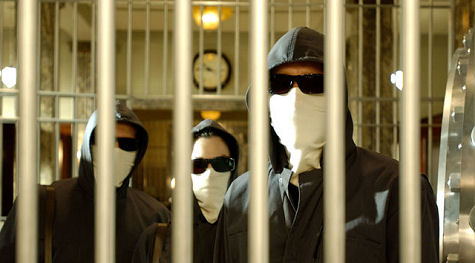
Invoking Dog Day Afternoon might be the wrong way to put it. Inside doesn’t have the borough personality of that Sidney Lumet film, and its thieves aren’t oddball screw-ups.
Four super-organized hardcore pros (led by Clive Owen) hit a downtown Manhattan bank with military precision, and their first maneuver is to take hostages. The fuzz (led by detectives Denzel Washington and Chiwetel Ejiofor, and backed up by a uniformed Willem Dafoe) soon get wind and surround the building, and the usual tense negotiations and psychological stand-offs ensue.
< ?php include ('/home/hollyw9/public_html/wired'); ?>
Seen it before? Same-old same-old with the deck reshuffled? Okay, maybe, to some extent…but Inside Man has the panache and blue-chip confidence of a slam-dunk enterprise, and is one of those nicely refined thrillers that keep you guessing and fully engrossed. Not especially violent or sensationalistic…just a good, gripping pulse-pounder.
Add to this the contributions of costars Jodie Foster (as a high-end fixer and financial consultant) and Christopher Plummer (as a loaded philanthropost and friends-of-powerful-people type) and…well, they definitely sweeten the pot.
It’s surprising at first to find the director of Do The Right Thing doing a genre thriller, although it’s clear early on he knows precisely what he’s doing.
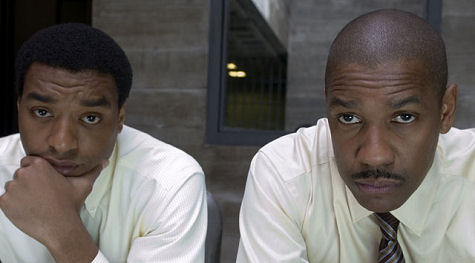
Chiwetel Ejiofor, Denzel Washington in Inside Man
The action is centered on an old Wall Street-area bank — Manhattan Trust — owned by Plummer’s character. The action kicks in right at the start when Owen and his three conspirators kill the surveillance cameras and take over the bank and force everyone to put on identical jump-suits…
I don’t know if it’s such a good idea to run down the particulars.
The main thing is that Owen’s guy, Dalton Russell, is very steady and on top of things, and in no way some kind of hair-trigger asshole. The curious thing is that he doesn’t seem very interested in bagging the heaps of cash in the vault (like the guys in Heat were)…and the film doesn’t give any decent hints what he’s after for a good long while.
Washington’s detective, an old-fashioned guy with a thin moustache, a shaved head and a straw hat, doesn’t do all that much, preferring to watch and wait rather than attack and risk lives. He’s cool and not of a mind to upset anyone or anything. He tries a couple of times to trip up or fake-out Owen, but nothing radical….just fun stuff.
Then we start seeing portions of after-the-fact hostage interviews, shot with a grainier, half-sepia color scheme. This deflates the suspense a bit because it tells us early on the robbers were never identified, probably…although we’re not entirely sure. It’s still interesting, though. Everything in this film is. Nothing boring or numbing or flaccid.

I’m not going to spill any more. The only thing I feel compelled to mention are the strange sartorial choices made by Denzel’s detective. He dresses like it’s 1964 and Malcolm X is still alive and he’s the owner of an illegal Newark, New Jersey, bookmaking operation. Or a jazz club owner in Tennessee in 1958. Very strange. The idea seems to have been to make Denzel’s detective look like some kind of anachronism.
Washington is unexceptional but fine. Owen is icy, commanding and a very cool bad guy..even though he wears a mask for a good portion of the film. Ejiofor is sturdy, Dafoe is fine, Foster is cool and so is Plummer. Nobody is rewriting the book on great acting here, but they’re all pros and it all goes down like low-fat chocolate yogurt.
For a film that last 128 minutes, Inside Man whips right by. It seems to be over and done within 95 or 100 minutes, tops.
This is a first-rate shallow entertainment, and I can’t wait to see it again. It’s not a movie for munching popcorn through, or making lobby cell-phone calls or taking bathroom breaks while it’s playing. It’s a great film for saying “please be quiet” to the people sitting behind you because they’re won’t shut the fuck up and you really need to hear every line. It’s one of those “please, Michael Moses…can I come to the premiere party?” movies.
Enemies Watch
Last Friday night I read James Vanderbilt’s gripping, pared-to-the-bone screenplay of Against All Enemies, an adaptation of former terrorism czar Richard Clarke’s bombshell novel about the failures of the Clinton and Bush administrations to stop the terrorist plotters who eventually brought about the 9.11 attacks.
The script, yet another example of a fascinating run of political films being made by mainstream Hollywood these days, is the basis of an upcoming Columbia feature that Crash director Paul Haggis “[hopes] to shoot…this year,” according to what he told N.Y. Times reporter Sharon Waxman in a piece that ran last Tuesday.
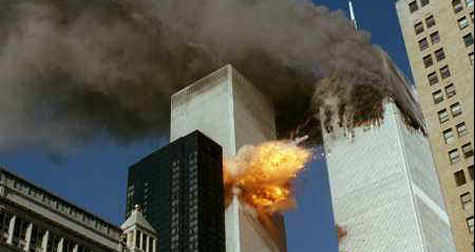
My first casting question, apart from the matter of whether or not Tom Hanks will agree to play Clarke, is who the hell is Haggis going to get to play President Bill Clinton? Damned if he isn’t right in the script, Arkansas accent, inquisitive mind and all. And in three good scenes.
Former National Security Advisor (and current Secretary of State) Condoleeza Rice is also a character with dialogue, and not a very sympathetic one. (No way around this — the facts are the facts.)
Vice-President Dick Cheney, National Security honcho Paul Wolfowitz and Clinton’s security adviser Anthony Lake are also characters, along with numerous other real-life figures. All with dialogue. Not as fictional stand-ins (as certain Clinton operatives were portrayed in Mike Nichols’ Primary Colors), but their literal selves.
Unfortunately, President Bush — who is certainly one of the villains of the piece, if you regard willful ignorance as a form of villainy — is an off-screen presence.
Against All Enemies is a riverting political drama — All The President’s Men meets Franz Kafka in the age of terrorism.
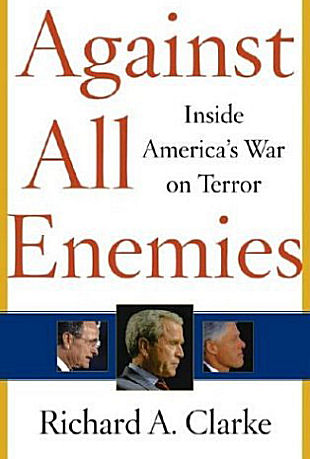
Every scene feels like it’s been chiselled and buffed to perfection (or at least my idea of that). And it has a sympathetic vulnerable hero (a government operator with no life who’s obstinate to a fault, and yet is a true vigilant soldier) and moments of warmth and humor and tragedy, and well-drawn secondary characters, and a finale that gives some 9/11 closure.
It’s about a dedicated hardcase lacking in certain diplomatic skills named Richard Clarke (Jason Robards would have been perfect in the mid ’70s, but right now Hanks-with-white-hair would be the absolute best choice) and his slow journey of discovery about what the Middle Eastern chess game is all about, play by play, and how the jihadists came to occupy and gradually rule the roost.
Scene by scene, act by act, Clarke keeps telling various government do-nothings what Middle Eastern terrorists might be up to, and nobody listens all that much. (Clinton’s people are more responsive than Bush II’s, but nobody acts brilliantly.) Then the Dubya do-nothings turn around after 9/11 and try to stick it to Clarke for being right.

Richard Clarke
It has a 24-page opening sequence that absolutely kills in terms of tension and psychological suspense, showing the White House staffers in turmoil on the morning of 9/11.
Then it rewinds back to start of Clarke’s government career in the late ’70s (when he was in his late 20s) and takes us on a journey of gradual discovery as Clarke learns more and more about the Mujahdeen, Islamic fundamentalists, offensive Jihad, “Usama” bin Laden and so on.
Then it’s back to 9/11 and Clarke’s confusion when the Bushies decide to use the attacks as an excuse to go to war with Iraq, and then his leaving the White House and writing his book and delivering his rant before a Congressional 9/11 committee, and finally his apology…even though he’s arguably the least guilty guy in the Washington establishment as far as 9/11 negligence is concerned.
Haggis told Waxman he hopes to turn Clarke’s book about “how we got ourselves into this mess” into a political thriller like All the President’s Men. “I don’t know how to do it, so that’s why I want to attempt it,” he explained. “It could be really embarrassing.”
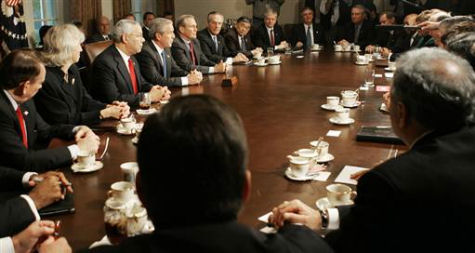
If Hanks agrees to play Clarke (and he really should consider doing this — the film needs his good-guyness) and Against All Enemies is directed in the right way, with precisely the right pitch, it may indeed stand a chance of being compared favorably to All The President’s Men.
Okay, it’s a little wonky and it’s almost all about men and women in suits jawing with each other about intelligence and strategy, but it’s extremely tight and absorbing. I felt something hard, clean and special on every page.
The film is being produced by Haggis, John Calley and Larry Becsey with Colum- bia execs Doug Belgrad and Rachel O’Connor overseeing, as it were. Haggis didn’t give Waxman any hints about casting, but said “there’s a good list of people out there.”
Variety‘s Nicole LaPorte reported on 3.12 that Against All Enemies is “not necessarily” Haggis’s next project….but it should be. Nobody knows how long political films will continue to be hot in this own — better to strike when the iron is hot.

Clinton appears in three scenes between page 59 and 64, and he’s got a great scene on page 63 in which he comes off smart and resourceful and confident. And he laughs, and makes others laugh. He’s not the hero (that’s Clarke’s role) but Clinton is portrayed as a reasonably okay guy — a chief exec who gets it and sees the value in having a guy like Clarke nearby.
Vanderbilt’s script is so smart and sharp, and delivers so thoroughly in terms of authenticity, that the only actors on the planet who could sell the Clinton scenes would be either David Morse (a dead ringer) or John Tavolta, who of course played a character based on Clinton in Primary Colors . But even Morse or Travolta would feel a tiny bit wrong. To me, anyway.
I’m just going to say this: President Clinton should consider playing himself in this film. Seriously. He’d be great, he’d obviously be convincing and he’d be helping to recreate a very close approximation of the truth.
Besides the fact that a move like this would be the next logical step in the Holly- wood-Washington blender machine. Things have reached a point (remember those real-life Washingtonians taking to “drug czar” Michael Douglas in Traffic?) where a former President acting in a classy film like this would not be seen as all that curious. If you ask me it would have a kind of dignity.
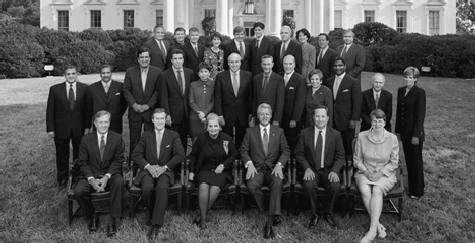
Clinton cabinet
I asked for casting suggestions on Saturday, and here’s the best of them so far…
Richard Clarke: Tom Hanks, Phillip Seymour Hoffman, a slimmer James Gandolfini (looking to de-Soprano-cize his image by playing a wonky type).
Bill Clinton: Clinton himself, David Morse, John Travolta.
Dick Cheney: Jason Alexander (white hair, aged a little), Ben Kingsley.
Paul Wolfowitz: Alan Rosenberg, William H. Macy (a little make-up, hair coloring), Ron Silver.
Condoleeza Rice: Angela Bassett, Regina King, Merrin Dungey (from King of Queens/Alias/Curb)
Anthony Lake: Jude Ciccolella (excellent in 24 )
Havana Rap
To judge from three recent docs about bullet-dodging rappers living in volatile ‘hoods, the most intense and socially relevant rap music these days is coming out of the Caribbean area.
George Gittoe’s Rampage makes the case for the rap community in south Miami, Asger Leth’s Ghosts of Cite Soleil injects rap into the hell of Haiti’s poltical turmoil, and directors Jauretsi Saizarbitoria and Emilia Menocal show what the Cuban rap scene is about in East of Havana.
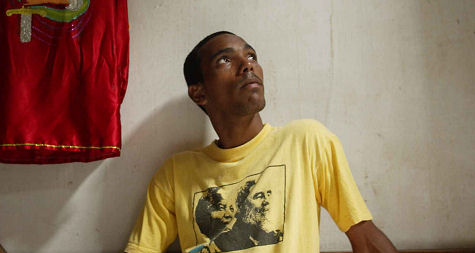
El Cartel’s Mikki Flow in Jauretsi Saizarbitoria’s East of Havana
Each film has its own style and aesthetic, but Saizarbitoria’s film is quite different than the other two, and not just because Charlize Theron produced it.
Caught earlier this week at South by Southwest by HE columnist Moise Chiullan, Havana is about the popularity of underground rap groups in Cuba and particularly three members of El Cartel, one of a small number of rapper groups in the suburbs of Havana.
There are two things that set El Cartel apart from standard-issue American rappers — gender equality (a relatively rare thing in hip-hop circles) and sharply political lyrics.
Instead of rapping about bitches, ho’s and flashing dough around, Cartel’s Mikki Flow, Soandry and Magyori (i.e., a female) tell stories about the daily struggle of living in post-Soviet Cuba .
The story surrounds the cancellation — censorship — of Cuba’s annual Rap Festival in 2004. Government representatives say it was due to hurricane damage, but the homie-in-the-street view is that The Man is keeping them down.
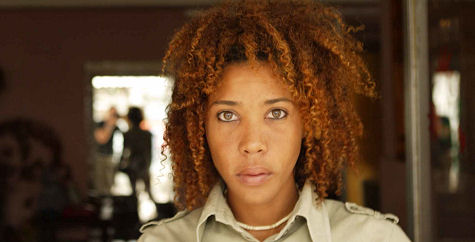
Magyori, also of El Cartel
The film says something quite interesting, which is that as much as Cuban citizens may fear the power of the government, the government fears its people and their freedom of expression exponentially more. Political unrest isn’t ebbing away. Poverty is worsening, economic resources are being more and more depleted, and Cuba’s long-standing dictator Fidel Castro is getting older every day.
Most Americans are unaware of the crushing effect of the Cuban embargo, and how 90 miles from the U.S. lies an island nation where there are computers but no internet and music but no iPods. But life moves along and things happen “por invento” — i.e., by invention.
Living life the Cuban way is a central concept to the poetry these rappers create: they use their passion and pain to distill literate, provocative lyrics that leave a profound impression on you. Their rap pounds to the rhythm of el corazon del barrio (the heart of the ‘hood) and uses this evolving art form to its pinnacle.
When word spread around South by Southwest crowds that Theron was Havana‘s producer, there was talk all over about her “doing it for credibility” or “trying to make it look like she cares.” Not quite so. The directors and producers of East of Havana have known Theron since she came to the U.S. from South Africa. They also acted as a surrogate family for her when she was “this little South African girl who didn’t speak any English.”
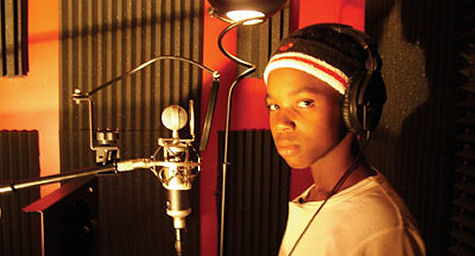
Denzel Lovett, a 14 year-old rapper, in George Giddoes’ Rampage
East of Havana almost didn’t happen, as the filmmakers made it into Cuba just a few weeks before President Bush further clamped down on travel to Cuba. Too bad — the El Cartel crew has expressed a strong desire to travel around and explore other cultures, given the opportunity.
Wim Wenders The Buena Vista Social Club showed us one side of Cuban music and culture, but East of Havana finally reveals the voice of contemporary Cuban youth and the rise of a very different new generation.
Look for more about this film in the coming months, as it was one of the most heavily-buzzed films of the festival.
Haiti, Sex, Death
Before last Sunday night I thought of Haiti as a hopeless Caribbean shithole, one of the worst places to live in the world because the government corruption and the politically-motivated beatings and killings never seem to stop, and because the poverty levels for most of the citizens are beyond belief.
I still see Haiti as an island most foul, but a knockout documentary called Ghosts of Cite Soleil, a kind of Cain-and-Abel story that was filmed just before, during and after the overthrow of Haitian president Jean Bertrand Aristide in March 2004, has added a new dimension.
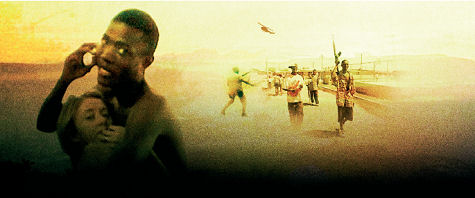
The real-life 2pac and Lele as they appear in Asger Leth’s Ghosts of Cite Soleil
I now see Haiti as less of a Ground Zero for abstract political terror and more of a place where people on the bottom rung are trying to live and breathe and create their own kind of life-force energy as a way of waving away the constant hoverings of doom.
In short, this excellent 88-minute film, directed by Asger Leth (the son of Danish filmmaker Jorgen Leth), adds recognizable humanity to a culture that has seemed more lacking in hope and human decency than any other on earth. I saw it at the Wilshire Screening Room two and a half days ago, and it’s been a kind of growth experience for me. I feel like I almost “get” Haiti now, and I haven’t stopped telling people about it since.
Everyone will say that Ghosts is City of God but in ‘real’ verite terms…and it is that, of course. But it’s less about violent street crime than stink-from-the-head Haitian politics, and it explores an unusual romantic triangle between a white French female relief worker namd Lele and two gangster brothers, 2pac and Bily (not “Billy”), and it has a tragic ending that touches you as much as any well-crafted Hollywood tearjerker could…and yet it happened all on its own.
2pac and Bily are in no way the “good guys,” but in a way they are. They wave guns around and talk all the time about defending their territory or making an enemy back off or perhaps having to kill each other, but somehow the film makes them seem like half-sympathetic pawns…somewhat vulnerable sociopaths desperately trying to escape from their cage.
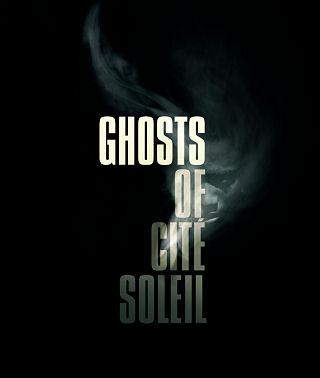
The brothers were leaders of gangs (there were five altogether, all of them known as “the Chimeres”, which is French for “ghosts”) who were being paid big money by the Aristide government to rough up or in some cases eliminate political oppo- nents. Director George Hickenlooper (Factory Girl), who invited me to Sunday’s screening in his capacity as one of the doc’s exec producers, said 2pac and Bily received “hundreds of thousands” of dollars.
When Aristide was finally forced out of office 2pac and Bily were suddenly targets of the new guys in power who wanted to get rid of all remnants of Aristide’s reign, including the “muscle.”
What was special in the making of Ghosts of Cite de Soleil was that Leth had totally open access to both brothers (as well as their government opponents), and also that life played out like a story written by a skilled dramatist.
This is precisely what Ghosts of Cite de Soleil could be the next time — a dramatic movie shot on location in Haiti with actors, a script, grips, electricians, etc.
On Monday I spoke with Cary Woods, the doc’s executive producer, who agreed that Ghosts of Cite Soleil could become a mainstream feature because (and this is primarily me talking) it has all the Shakespearean elements: poverty, political warfare, corruption, the cycle of violence, Cain and Abel, a romantic triangle, and a tragic finale.
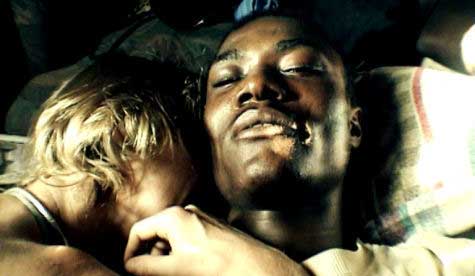
And as a scripted feature it could get a bit more into the warring-brothers- sleeping-with-the-same-woman thing, which the doc doesn’t really run with.
Woods told me that a certain big-name actress has expressed interest in playing the Lele character if and when a script is written and a film is up and rolling, and then producer Seth Kanegis called me from somewhere in the Caribbean Tuesday afternoon and said Woods is looking to hire a distinguished, big-name writer to do the screenplay.
This would be a perfect feature for Oliver Stone, Alejandro Gonzalez Innaritu, Werner Herzog…any director who could take the grit and social squalor of Haiti’s Cite de Soleil and reenact the story with feeling and realism.
The thing that needs to happen right now is for Ghosts of Cite Soleil to be accep- ted into the Cannes Film Festival’s Director’s Fortnight section so the festival-scout community can see it and talk it up. And then it should go to Toronto Film Festival in September, which would probably lead to some kind of distribution deal.
A film like this can only do what it can do. Film buffs and admirers of hot-button filmmaking and drama-in-the-rough will go for it, but some movigeoers would probably have a bit of difficulty with a film of this sort…a raw-looking, hand-held video piece about killings and squalor and interracial sex.
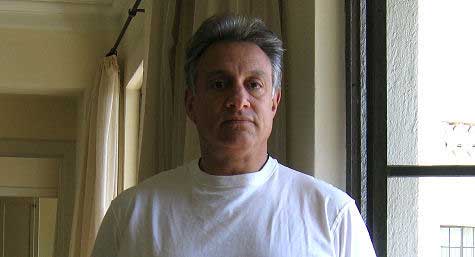
Ghosts executive producer Cary Woods
The feature that could come from this — that’s the thing. But there are miles to go before that happens…if it happens at all. Life is a gamble and movies are about rolling stones slowly uphill.
I haven’t mentioned the Wylcef Jean hip-hop on the soundtrack (the Haitian-born musician is also one of the film’s exec producers) and 2pac’s seeing himself as a burgeoning hip-hopper and his dream of becoming a musician-star. A Wyclef Jean soundtrack CD of some kind would, I understand, be part of the Ghosts package when and if it opens theatrically. I’m not 100% sure about this, but it would make sense.
Look for more about this film in the coming months, as it was one of the most heavily-buzzed films of the festival.












